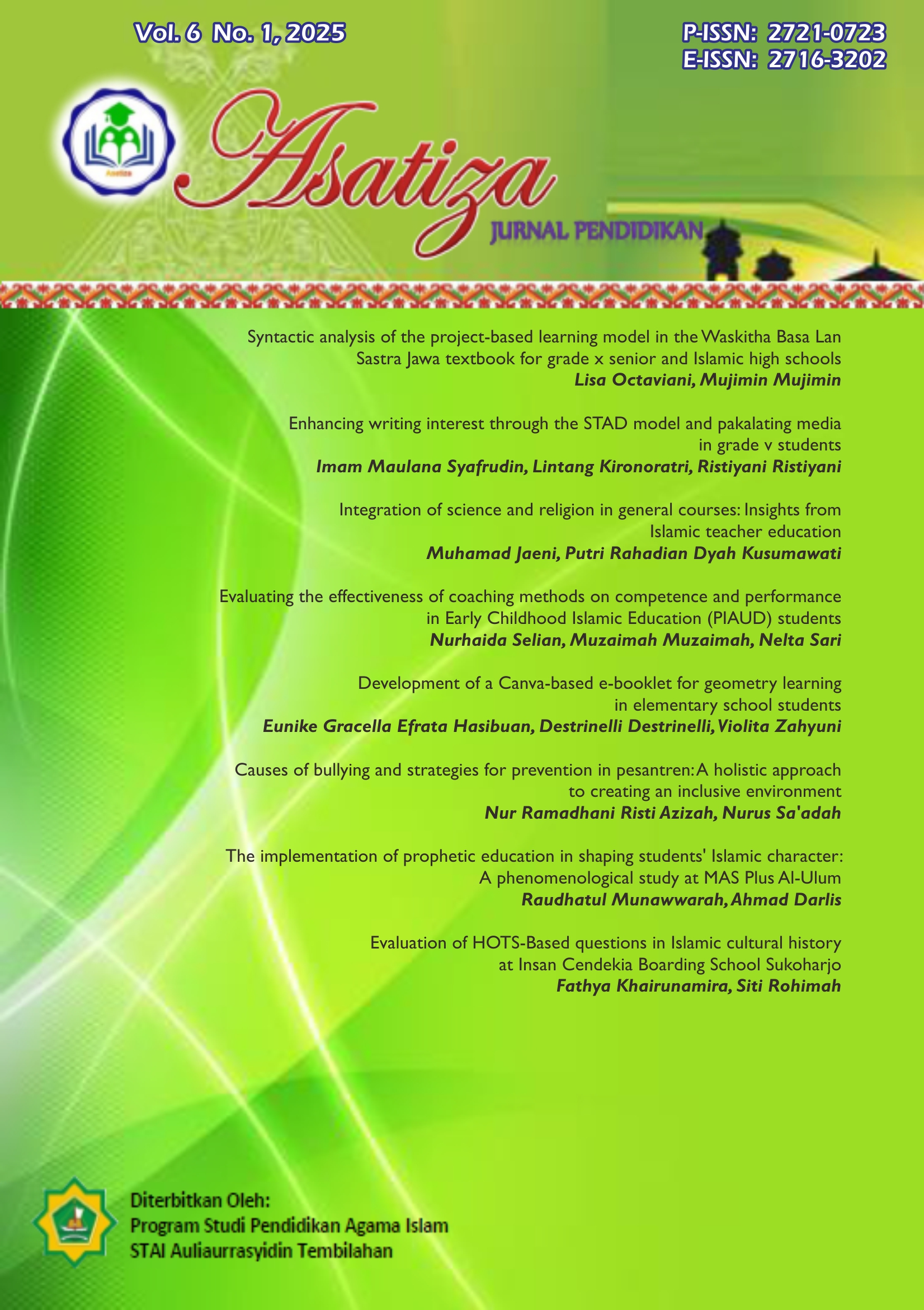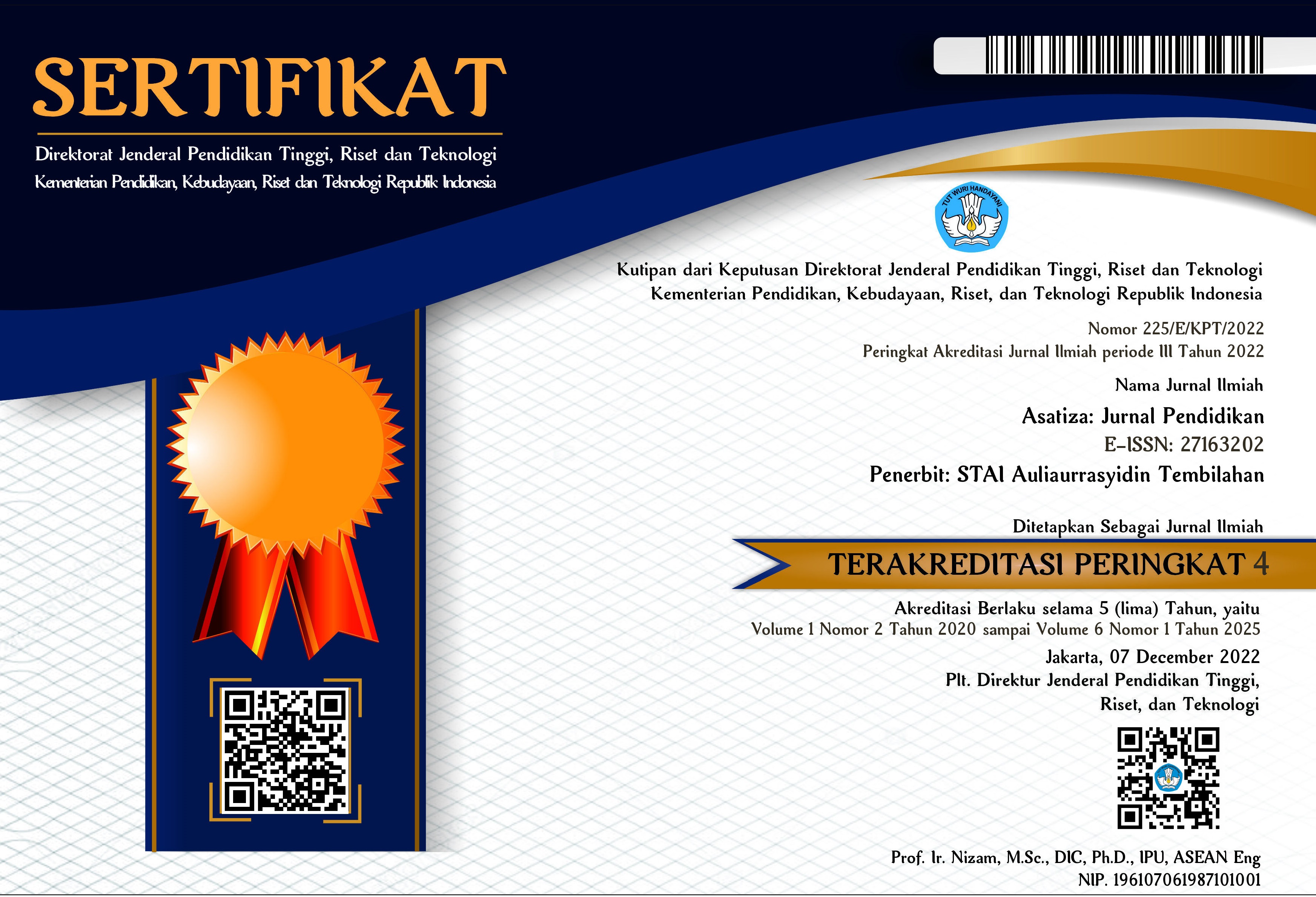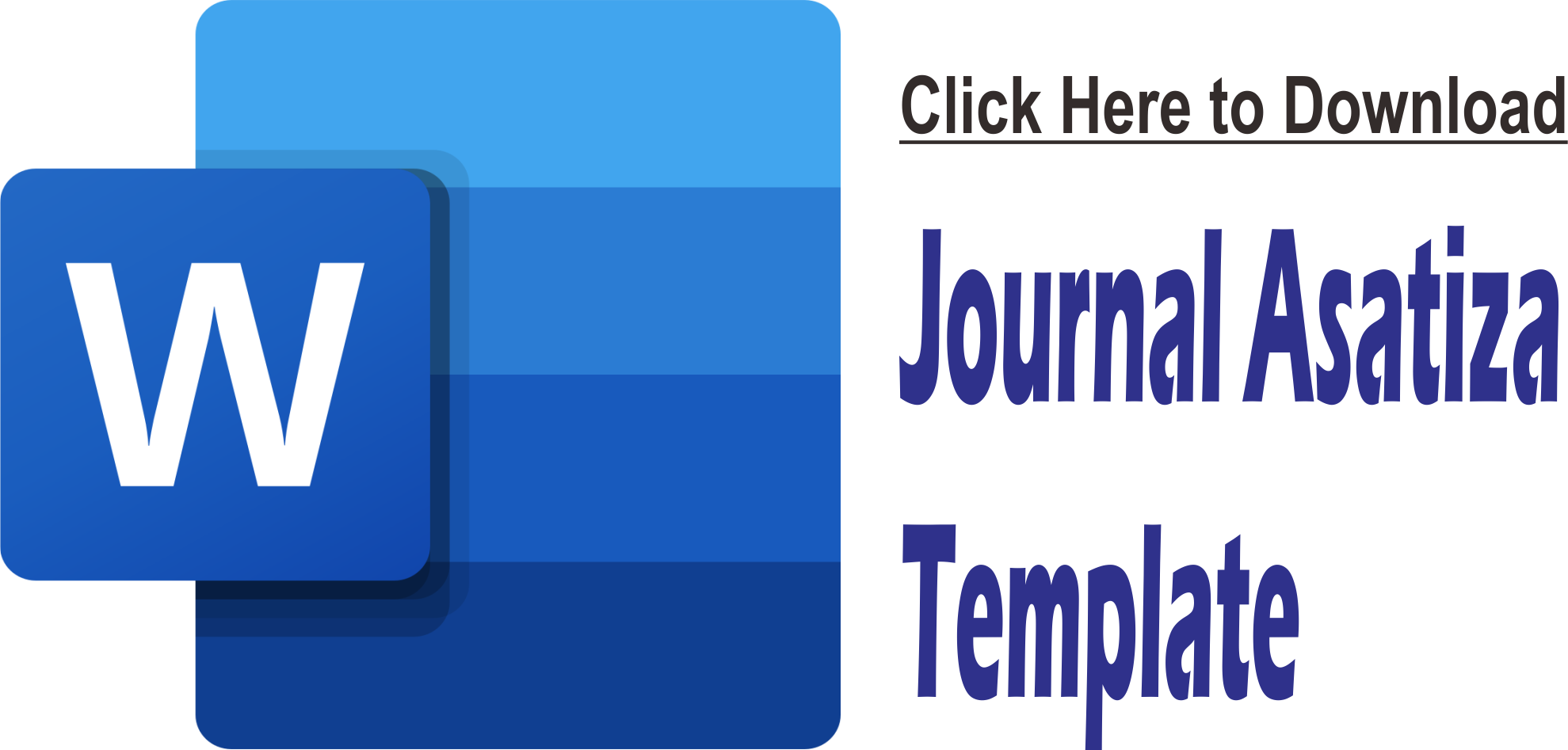Syntactic analysis of the project-based learning model in the Waskitha Basa Lan Sastra Jawa textbook for grade x senior and Islamic high schools
DOI:
https://doi.org/10.46963/asatiza.v6i1.2213Keywords:
Textbooks, Syntactic Learning Model, Independent CurriculumAbstract
Learning models play a critical role in the educational process. They are systematically designed as a guide for conducting learning activities to achieve educational objectives. Each learning model includes specific syntax that can be implemented by students under teacher guidance. This study aims to analyze the syntax of learning models based on the learning activities presented in the textbook published by Erlangga, titled Waskitha Basa lan Sastra Jawa for Grade X Senior and Islamic High Schools. The study employs a descriptive qualitative research method with observation and interactive analysis. The research instrument consists of data cards. The data analysis technique used is content analysis. The results of the study reveal that the Waskitha Basa lan Sastra Jawa textbook for Grade X, which consists of six chapters, includes four chapters (Chapters 1, 2, 3, and 4) that apply the Project-Based Learning model. However, two chapters (Chapters 5 and 6) were found not to implement any discernible learning model. This research provides valuable insights for textbook authors to ensure the completeness of the learning model syntax applied in textbooks. Consequently, the learning process facilitated by the textbook can be optimized and aligned with the intended learning model syntax to effectively achieve educational goals.
Downloads
References
Arraman, B. C., & Hazmi, N. (2018). Analisis Buku Teks Sejarah Kelas X Kurikulum 2013. KAGANGA: Jurnal Pendidikan Sejarah Dan Riset Sosial-Humaniora, 1(2), 122–140. https://doi.org/10.31539/kaganga.v1i2.404
Arsyad, M., & Fahira E.F. (2023). Model-Model Pembelajaran dalam Kurikulum Merdeka. Purbalingga: Eureka Media Aksara.
Sitepu, B. P. (2012). Penulisan Buku teks Pelajaran. Bandung: PT. Remaja Rosdakarya.
Billy, G., Sutrisna, B., Wayansujana, I., & Ganing, N. N. (2019). Model Project Based Learning Berlandaskan Tri Hita Karana Berpengaruh Terhadap Kompetensi Pengetahuan IPS. Jurnal Adat dan Budaya, 1(2).
Cyndiani, S., Asmah, S. N., & Nurcahyo, M. A. (2022). Analisis Model Project Based Learning (Pjbl) Pada Buku Siswa Tema 1 Kelas V Sekolah Dasar. Jurnal Kiprah Pendidikan, 1(4), 334-341.
Dewi, M. R. (2022). Kelebihan dan kekurangan Project-based Learning untuk penguatan Profil Pelajar Pancasila Kurikulum Merdeka. Inovasi Kurikulum, 19(2), 213–226. https://doi.org/10.17509/jik.v19i2.44226
Devi, S. K., Ismanto, B., & Kristin, F. (2019). Peningkatan kemandirian dan hasil belajar tematik melalui project based learning. Jurnal Riset Teknologi dan Inovasi Pendidikan, 2(1), 55-65
Hanifah, D. P., Hanifah, B. M., Amany, M., & Dyaahulhaq, S. F. (2023). Analisis Penerapan Kurikulum Merdeka: Kajian Buku Teks Bahasa Indonesia kelas 4 SD/MI. In Prosiding SEMAI: Seminar Nasional PGMI, 2, 10-21. http:/proceeding.uingusdur.ac.id/index.php/semai
Khoerunnisa, P., Syifa, &, & Aqwal, M. (2020). Analisis model-model pembelajaran. In Jurnal Pendidikan Dasar, 4,(1). https://ejournal.stitpn.ac.id/index.php/fondatia
Kurnia, J., Utaminingsih, S., & Masfuah, D. S. (2024). Peningkatan Hasil Belajar IPA dan Bahasa Indonesia Tema 3 Melalui Problem Based Learning Berbantu Media Video di SD 4 Karangbener. WASIS: Jurnal Ilmiah Pendidikan, 5(1), 1-6.
Lestari, D., Asbari, M., & Yani, E. E, (2023). Kurikulum Merdeka: Hakikat kurikulum dan pendidikan. Journal of Information Systems and Management (JISMA), 2(6), 85-88.
Made, A. M., Ambiyar, A., Riyanda, A. R., Sagala, M. K., & Adi, N. H. (2022). Implementasi model project based learning (PjBL) dalam upaya meningkatkan hasil belajar mahasiswa teknik menis. Edukatif: Jurnal Ilmu Pendidikan, 4(4), 5162-5169.
Muhibbuddin, M. M., Zikha A, V., Natasya, D., Rizka R, A., & Trilisiana, N. (2024). Analisis Kesesuaian Implementasi Sintaks Project Based Learning dalam Proses Pembelajaran. Epistema, 5(1), 42-57. https://doi.org/10.21831/ep.v5i1.63964
Nugraha, I. R. R., Supriadi, U., & Firmansyah, M. I. (2023). Efektivitas Strategi Pembelajaran Project Based Learning dalam Meningkatkan Kreativitas Siswa. Jurnal Penelitian Dan Pendidikan IPS, 17(1), 39-47.
Nugrohadi, S., & Anwar, T. (2022). Pelatihan Assembler Edu untuk Meningkatkan Keterampilan Guru Merancang Project-based Learning Sesuai Kurikulum Merdeka Belajar. Media Penelitian Pendidikan: Jurnal Penelitian Dalam Bidang Pendidikan dan Pengajaran, 16(1), 77–80. https://doi.org/10.26877/mpp.v16i1.11953
Pertiwi, A. D., Nurfatimah, S.A., & Hasna, S. (2022). Menerapkan metode pembelajaran berorientasi student centered menuju masa transisi kurikulum merdeka. Jurnal Pendidikan Tambusai, 6(2), 8839-8848.
Rahayu, R.., Rosita, R., Rahayuningsih, Y. S., Hernawan, A. H., & Prihantini, P. (2022). Implementasi Kurikulum Merdeka Belajar di Sekolah Penggerak. Jurnal Basicedu, 6(4), 6313–6319. https://doi.org/10.31004/basicedu.v6i4.3237
Ridwan, T., Sutandi, M., Fajar R., Miftah M. A., Fajar M. N., Mohamad F. S., Syahrul R., Mucholis, & Satya W. (2022). Implementasi Model Projek Based learning di SMPN 2 Klangenan Cirebon.
Sabbok M. (2021). Peningkatan Hasil Belajar Siswa Kelas IV dengan Penerapan Project Based Learning di SD Negeri Inpres Kayobunga Semester Ganjil Tahun Pelajaran 2018/2019. Jurnal Merdeka Mengajar (JMM), 2(1), 55–61.
Salhuteru, J., Rumahuru, O., Kainama, L., Unitly, M., & Amanukuany, R. (n.d.). Model-Model Pembelajaran Dalam Implementasi Kurikulum Merdeka.
Saraswati, D.A., Sandrian, D. N., Nazulfah, I., Abida, N. T., Azmina, N., Indriyani, R., … & Lestari, I. D. (2022). Analisis Kegiatan P5 di SMA Negeri 4 Kota Tangerang sebagai Penerapan Pembelajaran Terdiferensiasi pada Kurikulum Merdeka. Jurnal pendidikan mipa, 12(2), 185–191. https://doi.org/10.37630/jpm.v12i2.578
Septiani, A. (2022). Implementasi kurikulum merdeka ditinjau dari pembelajaran matematika dan pelaksanaan P5 (studi di SMA Negeri 12 Kabupaten Tangerang). AKSIOMA: Jurnal Matematika dan Pendidikan Matematika, 13(3), 421-435.
Susanto, D., & Jailani, M. S. (2023). Teknik Pemeriksaan Keabsahan Data Dalam Penelitian Ilmiah. QOSIM: Jurnal Pendidikan, Sosial & Humaniora, 1(1), 53-61.
Susilowati, E. (2022). Implementasi kurikulum merdeka belajar pada mata pelajaran pendidikan agama islam. Al-Miskawaih: Journal of Science Education, 1(1), 115-132.
Ulya, C., & Sukmawati, N. (2023). Problematika Implementasi Model Pembelajaran Berbasis Proyek pada Kurikulum Merdeka di SMP Negeri 8 Surakarta. Jurnal Sinestesia, 13(2). https://sinestesia.pustaka.my.id/journal/article/view/448
Wahyuningsih, L., Suhita, R., Nugraheni, D., & Wardani, E. (2015). Analisis kelayakan buku teks bahasa jawa kurikulum 2013 tingkat SMP.
Downloads
Published
Issue
Section
License
Copyright (c) 2025 Lisa Octaviani, Mujimin Mujimin

This work is licensed under a Creative Commons Attribution-ShareAlike 4.0 International License.
Authors who publish with this journal agree to the following terms:
1. Copyright on any article is retained by the author(s).
2. The author grants the journal, right of first publication with the work simultaneously licensed under a Creative Commons Attribution shareAlike 4.0 International License that allows others to share the work with an acknowledgment of the work’s authorship and initial publication in this journal.
3. Authors are able to enter into separate, additional contractual arrangements for the non-exclusive distribution of the journal’s published version of the work (e.g., post it to an institutional repository or publish it in a book), with an acknowledgment of its initial publication in this journal.
4. Authors are permitted and encouraged to post their work online (e.g., in institutional repositories or on their website) prior to and during the submission process, as it can lead to productive exchanges, as well as earlier and greater citation of published work.
5. The article and any associated published material is distributed under the Creative Commons Attribution-ShareAlike 4.0 International License











2.png)



